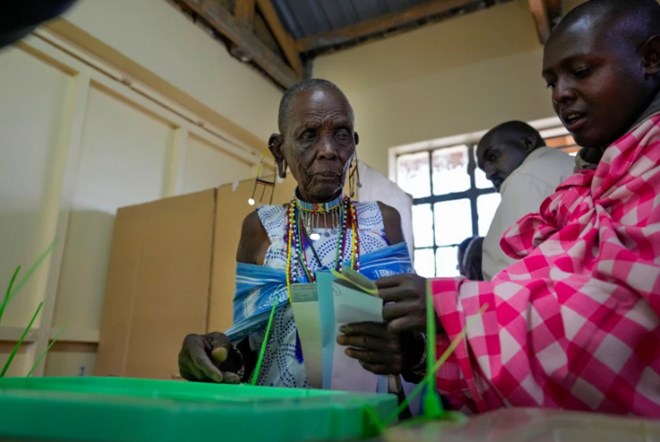
By Eromo Egbejule
Friday August 12, 2022

People line up to vote at the Oltepesi Primary School, Kajiado County in Nairobi, Kenya, Tuesday August 9, 2022 [Ben Curtis/AP Photo]
Nairobi, Kenya – It has been two days since voting ended in Kenya’s closely contested presidential election but for many citizens of the country, it feels like much longer.
“I am very anxious,” said Jacqueline Adhiambo, a 31-year-old resident of Eldoret, in western Kenya. “When I wake up in the middle of the night, I have to fight to desire to check my phone or turn on the television.”
Adhiambo, a voter registered in Eldoret, a stronghold of its most famous son, Deputy President and presidential candidate William Ruto, left her town for the capital, Nairobi, on the eve of the August 9 election. She was worried that violence could break out if Ruto lost to his closest competitor, Raila Odinga.
That line of thinking was critical to a 64 percent turnout in Tuesday’s election – a drop from almost 80 percent in 2017.
Still, only a few within the country and the region – Kenya is East Africa’s biggest economy and democracy – have not been following the post-electoral process.
Across the country, many citizens turned on their radios and televisions, even as others stayed glued to social media to get updates.
Dozens of civil society organisations as well as the media and influential National Council of Churches of Kenya (NCCK) are keeping parallel tallies.
In their tallies, several media outlets have separately shown Ruto and Odinga in the lead, triggering confusion nationwide.
But Ruto has been outperforming opinion polls, which put him marginally behind his rival.
IEBC has said tallying and verification would begin after it had received physical copies of Form 34-As, as the polling results form is called, from each of the 46,229 polling stations across the country.Kenya’s Independent Electoral and Boundaries Commission said 46,138 of 46,229 forms with presidential election results have been received as of noon (09:00 GMT) on Thursday. Its website showed that 99 percent of the results from polling units had been uploaded.
To win the presidency, either candidate must get more than 50 percent of the vote and at least 25 percent in at least 24 out of Kenya’s 47 counties.
As observers, citizens and those in neighbouring countries watch for the outcome of the elections, there have been calls for peace, given Kenya’s history of disputed elections, which have sometimes resulted in violence.
In 2007, Odinga’s loss triggered violence which eventually ended in the deaths of more than 1,000 people and left in excess of 600,000 displaced, according to human rights groups.
“[We] would like to appeal to all political actors and stakeholders … to continue to maintain peace after the results of elections are declared,” former Tanzanian President Jakaya Kikwete, head of the East Africa Community observer mission said at a news conference on Thursday morning.
“We elected our leaders and have no further power from there as voters. I’m hoping my candidate will win but whatever the outcome is, we hope for peace,” said 76 year-old Phelgona Owiddo, resident of Kisumu, which delivered a 99 percent showing for Odinga.